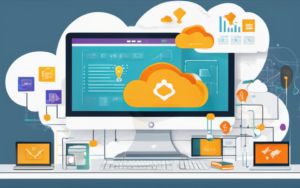The rapid urbanization of our planet has brought with it a myriad of challenges, from traffic congestion and environmental pollution to resource management and citizen well-being. Enter cloud computing, a transformative technology poised to revolutionize urban living and propel the development of smart cities.
Cloud Computing: The Catalyst for Smart City Innovation
The Rise of Smart Cities
Smart cities are urban environments that leverage technology to improve the quality of life for their citizens and enhance their efficiency and sustainability. These cities embrace interconnected networks of sensors, devices, and software to gather and analyze data, enabling informed decision-making and proactive problem-solving.
Cloud Computing’s Role in Smart City Development
Cloud computing serves as the bedrock for smart city infrastructure, providing the processing power, storage capacity, and scalability needed to manage massive datasets and support the diverse applications that drive urban innovation. By offering on-demand access to computing resources, cloud platforms enable cities to quickly adapt to changing needs and deploy new services with agility.
Key Applications of Cloud Computing in Smart Cities
Data Management and Analytics
Real-time Data Collection and Processing
Cloud-based platforms facilitate the real-time collection and processing of data from various sources within the city, including traffic sensors, air quality monitors, and smart meters. This data flow provides a continuous stream of insights into urban dynamics, allowing city planners and officials to respond to situations in real-time and improve decision-making.
Predictive Analytics for City Planning
Cloud computing enables the application of advanced analytics techniques, such as machine learning and artificial intelligence, to analyze historical data and predict future trends. This allows for more informed city planning, including traffic flow optimization, resource allocation, and infrastructure development.
Smart Infrastructure and Utilities
Smart Grid Management
Cloud-based solutions empower smart grid management, enabling utilities to optimize energy consumption, manage distributed energy resources, and enhance grid reliability. Cloud computing facilitates real-time monitoring of grid performance, predictive maintenance, and demand response programs, leading to greater energy efficiency and cost savings.
Traffic Management and Optimization
Cloud platforms enable the development of intelligent traffic management systems that use real-time data from sensors and GPS devices to optimize traffic flow, reduce congestion, and improve travel times. Cloud-based applications can also support dynamic pricing strategies, encouraging drivers to choose alternative routes during peak hours and reducing congestion.
Citizen Engagement and Services
E-Governance and Citizen Portals
Cloud computing empowers the development of e-governance platforms and citizen portals, providing online access to government services, information, and feedback mechanisms. This fosters transparency, accountability, and citizen participation in the city’s governance and decision-making processes.
Smart City Apps and Services
Cloud platforms are instrumental in developing and deploying smart city apps and services that enhance citizen convenience and quality of life. These applications can range from parking availability and waste management to air quality monitoring and emergency response systems.
Benefits of Cloud Computing for Smart Cities
Scalability and Flexibility
Cloud computing offers unparalleled scalability, allowing cities to easily adjust their computing resources as their needs evolve. This is crucial for managing the ever-growing volume of data generated by smart city applications and supporting the continuous expansion of urban infrastructure.
Cost-Effectiveness
Cloud platforms provide a pay-as-you-go model, allowing cities to only pay for the computing resources they actually use. This eliminates the upfront costs associated with purchasing and maintaining hardware, making cloud computing a cost-effective solution for smart city development.
Enhanced Security and Reliability
Cloud providers invest heavily in security infrastructure and employ advanced security measures to protect data and systems. This ensures the reliability and resilience of smart city applications, mitigating the risk of data breaches and cyberattacks.
Challenges and Considerations
Data Privacy and Security
The collection and processing of vast amounts of data in smart cities raise concerns about data privacy and security. Cities must implement robust data protection measures, comply with relevant regulations, and ensure transparency in data usage to build trust with citizens.
Interoperability and Data Sharing
Ensuring interoperability between different systems and facilitating data sharing between various stakeholders within the smart city ecosystem is critical for maximizing the benefits of cloud computing. Open data standards and APIs can help overcome these challenges.
Digital Divide and Accessibility
The benefits of smart city applications must be accessible to all citizens, regardless of their socioeconomic background or digital literacy. Cities need to address the digital divide and ensure equitable access to technology and digital skills training.
The Future of Cloud Computing in Smart Cities
Emerging Technologies and Trends
Cloud computing is constantly evolving, incorporating emerging technologies such as edge computing, blockchain, and artificial intelligence (AI). These technologies will further enhance the capabilities of smart cities, enabling more sophisticated data analysis, real-time decision-making, and personalized citizen experiences.
The Role of Cloud in Sustainable City Development
Cloud computing plays a crucial role in achieving sustainable urban development. By facilitating energy efficiency initiatives, optimizing resource management, and promoting sustainable transportation options, cloud-based applications contribute to reducing the environmental footprint of cities.
Building Smart Cities of the Future
Cloud computing is not just a technological solution; it is a catalyst for innovation and a driving force behind the creation of more livable, sustainable, and equitable cities. As we navigate the challenges of urbanization, cloud computing will continue to empower smart city development and pave the way for a brighter future for our urban environments.




